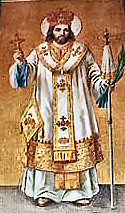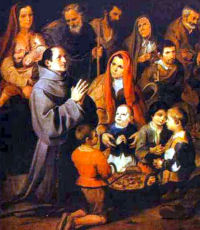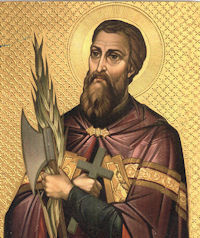Ordinary Time: November 12th
Memorial of St. Josaphat, bishop and martyr
Other Commemorations: St. Didacus, Religious (RM)
» Enjoy our Liturgical Seasons series of e-books!
Today the Church celebrates the memorial of St. Josaphat, a Catholic of the Ruthenian rite. Born in the then Polish region of Lithuania of Orthodox parents, he became a Catholic and a Ukrainian Basilian monk. Chosen bishop, he worked faithfully for the unity of the Church until he suffered martyrdom at the hands of an angry mob in Russia. His feastday in the Extraordinary Rite is celebrated on November 14.
According to the 1962 Missal of St. John XXIII the Extraordinary Form of the Roman Rite, today is the feast of St. Martin I who was pope from 649 to 654. He was a courageous defender of the faith against heresy. He held a council at Rome which condemned the Monothelite heresy which taught that Christ had no human but only a divine will. The heretical emperor, Constans II, had him treacherously arrested and taken to Constantinople. After many sufferings and humiliations, he was exiled to Cherson in the Crimea where he died of exhaustion in 654.
St. Josaphat
 Josaphat Kuncewitcz was born about the year 1580 at Vladimir, Volhynia, [part of the Polish province of Lithuania at the time] and given the name John at baptism. While being instructed as a child on the sufferings of our Savior, his heart is said to have been wounded by an arrow from the sacred side of the Crucified. In 1604 he joined the Ukrainian Order of Saint Basil (Basilians), lived as a monk in a very mortified life, went barefoot even in winter, refrained from the use of wine and flesh-meat, and always wore a penitential garb. In 1614 he was appointed archimandrite of Vilna, Russia and four years later archbishop of Polotzk; in this position he worked untiringly for Church reunion. He was a great friend of the poor, once even pledged his archepiscopal omophorion (pallium) to support a poor widow. The foes of union decided to assassinate him. In a sermon, he himself spoke of his death as imminent. When he visited Vitebsk (now in Russia), his enemies attacked his lodging and murdered a number of his companions. Meekly the man of God hastened toward the mob and, full of love, cried, "My children, what are you doing? If you have something against me, see, here I am." With furious cries of "Kill the papist!", they rushed upon him with gun and sword. Josaphat's body was thrown into the river but emerged, surrounded by rays of light, and was recovered. His murderers, when sentenced to death, repented their crime and became Catholics.
Josaphat Kuncewitcz was born about the year 1580 at Vladimir, Volhynia, [part of the Polish province of Lithuania at the time] and given the name John at baptism. While being instructed as a child on the sufferings of our Savior, his heart is said to have been wounded by an arrow from the sacred side of the Crucified. In 1604 he joined the Ukrainian Order of Saint Basil (Basilians), lived as a monk in a very mortified life, went barefoot even in winter, refrained from the use of wine and flesh-meat, and always wore a penitential garb. In 1614 he was appointed archimandrite of Vilna, Russia and four years later archbishop of Polotzk; in this position he worked untiringly for Church reunion. He was a great friend of the poor, once even pledged his archepiscopal omophorion (pallium) to support a poor widow. The foes of union decided to assassinate him. In a sermon, he himself spoke of his death as imminent. When he visited Vitebsk (now in Russia), his enemies attacked his lodging and murdered a number of his companions. Meekly the man of God hastened toward the mob and, full of love, cried, "My children, what are you doing? If you have something against me, see, here I am." With furious cries of "Kill the papist!", they rushed upon him with gun and sword. Josaphat's body was thrown into the river but emerged, surrounded by rays of light, and was recovered. His murderers, when sentenced to death, repented their crime and became Catholics.
—Excerpted from The Church's Year of Grace, Pius Parsch
Patronage: Ukraine; eparchy of Edmonton, Alberta; eparchy of Toronto, Ontario
Often Represented With: chalice; crown; winged deacon
Highlights and Things to Do:
- Pray to St. Josaphat for the reunion of the separated Eastern Churches.
- Read Pope John Paul II's Apostolic Letter on the Eastern Churches, Orientale Lumen.
- Read more about St. Josaphat:
- Read Pius XI's Encyclical Ecclesiam Dei on St. Josaphat and Pius XII's encyclical Orientales Omnes Ecclesias (On The Reunion Of The Ruthenian Church With Rome).
- Visit virtually the Basilica of St. Josaphat in Milwaukee, Wisconsin.
- Learn more about the different Eastern Rites which are in union with the Pope.
- Josaphat is the patron saint of Ukraine, but his life has Russian, Polish and Lithuanian influences. The recipes section has several highlighted recipes from these different regions.
- St. Josaphat's body was found incorrupt after being buried for 5 years. His body is now under the Altar of St. Basil in St. Peter's Basilica.
St. Didacus
 Didacus (or Diego, Jacob) was born in the town of San Nicolas, Andalusia. From early youth he showed a love for solitude. At Arrizafa, near Cordova, he became a Franciscan brother and was outstanding in humility and obedience. He had little formal education, yet through divine enlightenment in no way lacked wisdom. As a missionary he visited the Canary Islands and was appointed first superior of the new foundation there. In 1450 Pope Nicholas V confided to his care the sick in the celebrated convent of Ara Caeli. With his tongue he often cleansed the wounds of the sick. He miraculously healed many with oil from the lamp which burned before a picture of the Blessed Virgin or with the sign of the Cross.
Didacus (or Diego, Jacob) was born in the town of San Nicolas, Andalusia. From early youth he showed a love for solitude. At Arrizafa, near Cordova, he became a Franciscan brother and was outstanding in humility and obedience. He had little formal education, yet through divine enlightenment in no way lacked wisdom. As a missionary he visited the Canary Islands and was appointed first superior of the new foundation there. In 1450 Pope Nicholas V confided to his care the sick in the celebrated convent of Ara Caeli. With his tongue he often cleansed the wounds of the sick. He miraculously healed many with oil from the lamp which burned before a picture of the Blessed Virgin or with the sign of the Cross.
During a stay at the friary at Alcala in 1463, Didacus felt the approach of his last hour. Wrapped in discarded rags, with eyes fixed immovably upon a crucifix, he died while fervently praying the words of the hymn Dulce lignum, dulces clavos, O sweet wood, O sweet nails that held so sweet a burden! For a long time his body remained incorrupt. — The Church's Year of Grace, Pius Parsch.
Patronage: diocese of San Diego, California; Franciscan laity; Franciscan lay brothers.
Symbols and Representation: Bread and roses in a tunic; cross held by an angel.
Highlights and Things to Do:
- Learn more about St. Didacus:
- The Mission of San Diego was named after St. Didacus, and was the first mission of California, and still functions as a Catholic parish.






